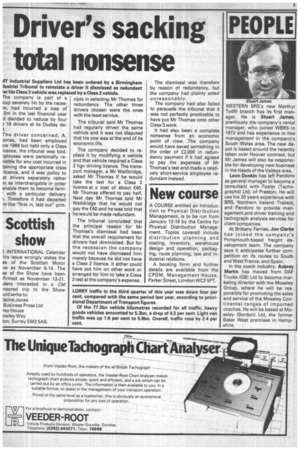Driver's sacking total nonsense
Page 7

If you've noticed an error in this article please click here to report it so we can fix it.
AT Industrial Suppliers Ltd has been ordered by a Birmingham Justrial Tribunal to reinstate a driver it dismissed as redundant ter his Class 3 vehicle was replaced by a Class 2 vehicle.
The company is part of a
D up severely hit by the reces-. )ri, had incurred a loss of .5m in the last financial year d decided to reduce by four 3 19 drivers at its Dudley de
The driver concerned, A. omas, had been employed ice 1966 but held only a Class icence, the tribunal was told. Iployees were personally rerisible for any cost incurred in taming the appropriate class licence, and it was policy to at drivers separately rather in as interchangable in order enable them to become famiwith a particular delivery 1. Therefore it had departed m the "first in, last out" prin ciple in selecting Mr Thomas for redundancy. The other three drivers chosen were the ones with the least service.
The tribunal said Mr Thomas had regularly driven the same vehicle and it was not disputed that his one was at the end of its economic life.
The company decided to replace it by modifying a vehicle and that vehicle required a Class 2 hgv driving licence. The transport manager, a Mr Wallbridge, asked Mr Thomas if he would take the test for a Class 2 licence at a cost of about £40. Mr Thomas offered to pay half. Next day Mr Thomas told Mr Walldridge that he would not pay the £40 and he was told that he would be made redundant.
The tribunal concluded that the principal reason for Mr Thomas's dismissal had been that the overall requirement for drivers had diminished. But for the recession the company would not have dismissed him merely because he did not have a Class 2 licence. It either could have put him on other work or arranged for him to take a Class 2 test at the company's expense. The dismissal was therefore by reason of redundancy, but the company had plainly acted unreasonably.
The company had also failed to persuade the tribunal that it was not perfectly practicable to have put Mr Thomas onto other Class 3 work.
It had also been a complete nonsense from an economic point of view. The company would have saved something in the order of £2,000 in redundancy payment if it had agreed to pay the expenses of Mr Thomas's test and made a relatively short-service employee redundant instead.












































































